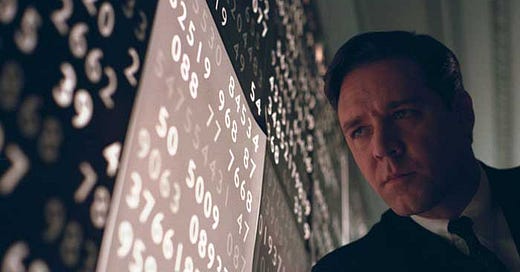Heroes of the Zeroes: A Beautiful Mind
The Heroes of the Zeroes is a daily, alphabetical look back at the 365 best films from 2000 to 2009.
"A Beautiful Mind" Rated PG-13 2001
Hardly an affectionate true-life protagonist, mentally ill mathematician John Nash had his life’s least savory aspects (fathering an illegitimate child, anti-Semitic exclamations) excluded from 2001’s “A Beautiful Mind.”
The film instead focused on Nash’s collegiate years, his revision of a long-held theory of economics and schizophrenia’s grip on his psyche and his marriage to Alicia (Jennifer Connelly’s Oscar-winning performance).
Had Ron Howard’s film purported to be journalism, such omissions would be unforgivable breaches of ethics and trust. But “A Beautiful Mind” was neither that nor what critics easily derided as “a Ron Howard movie.”
As Nash, Russell Crowe disappeared into this pile of contradictions just as he did Jeffrey Wigand in “The Insider” and in a way he did for no one in The Zeroes other than, well, Ron Howard.
Crowe’s personification sits between presumptuous prick and admirable outcast, as Nash’s collapse partially was borne of his own cockiness and insecurities. And once schizophrenia renders him a shuffling shell, the film offers a wellspring of genuine pathos and unlikely humor.
Howard and screenwriter Akiva Goldsman’s approach to Nash’s mental illness is at once surprising, scary and subtle — a memorable narrative loop runs alongside a grim 40-minute stretch of harrowing treatment and the slow road to recovery.
Crowe, Goldsman and Howard weren’t trying to solicit love or tears for Nash, as detractors bitterly claimed. “A Beautiful Mind” sought only acknowledgement of the silent, invisible and brave struggle that so many with mental illnesses endure each day.



